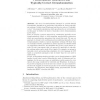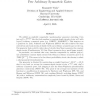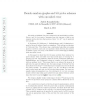12 search results - page 1 / 3 » Pseudorandom Generators, Typically-Correct Derandomization, ... |
ECCC
2010
13 years 5 months ago
2010
APPROX
2009
Springer
13 years 11 months ago
2009
Springer
The area of derandomization attempts to provide efficient deterministic simulations of randomized algorithms in various algorithmic settings. Goldreich and Wigderson introduced a n...
FOCS
1999
IEEE
13 years 9 months ago
1999
IEEE
Various efforts ([?, ?, ?]) have been made in recent years to derandomize probabilistic algorithms using the complexity theoretic assumption that there exists a problem in E = dti...
COCO
2005
Springer
13 years 7 months ago
2005
Springer
We exhibit an explicitly computable ‘pseudorandom’ generator stretching l bits into m(l) = lΩ(log l) bits that look random to constant-depth circuits of size m(l) with log m...
CORR
2011
Springer
12 years 8 months ago
2011
Springer
We study probabilistic bit-probe schemes for the membership problem. Given a set A of at most n elements from the universe of size m we organize such a structure that queries of t...



